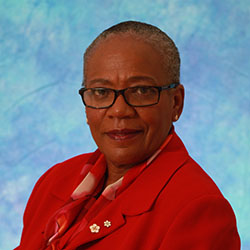If youвҖҷve ever spent even a few minutes browsing the , youвҖҷve got a sense of just how many public events and lectures happen all the time at the university: guest speakers, discussion panels, research presentations, open forums, conferences, you name it. While every event hopes to spark some sort of reaction вҖ”В be it inspiration, thought, or action вҖ” not all events transform into something larger.
Wanda Thomas BernardвҖҷs вҖңRacism is Killing Us SoftlyвҖқ is an exception. The lecture, which took place last fall as part of the James R. Johnston Chair in Black Canadian StudiesвҖҷ Distinguished Lecture Series, transitioned into a whole series of events in the winter term, all based on the enthusiasm of attendees and organizers alike.
And now the series is picking up again this fall, with five new lectures through this current academic year. The first takes place on Monday, October 19 in room 1108 of the Mona Campbell Building. Its title: вҖңRacism is Killing us Softly: But We Are Still Fighting for Change.вҖқ
The lecture, which will focus on the experiences of black social workers in Canada, is also a launch for Still Fighting for Change, a new book that chronicles the stories of 20 social workers and members of the Association of Black Social Workers and their experiences to address the systemic barriers that impact their lives and the lives of those they serve. Dr. Bernard is the bookвҖҷs editor.
Keeping the conversation going
The вҖңKilling Me SoftlyвҖқ events have each focused on a different exploration of racism within Halifax, Nova Scotia and Canada. The original lecture with that title, held on November 18 last year, focused on Dr. BernardвҖҷs own research on two fronts: an exploration of how racism and other forms of violence impacts African Canadian men, and a second exploring the impact of racism on the health of African Canadian women and families in rural Nova Scotia.
 Dr. Bernard (left), an Order of Canada and Order of Nova Scotia recipient who recently received DalвҖҷs first university-wide teaching award for diversity in education, has done more than her fair share of lectures in her career but says the reaction to the November 18 lecture was unique.
Dr. Bernard (left), an Order of Canada and Order of Nova Scotia recipient who recently received DalвҖҷs first university-wide teaching award for diversity in education, has done more than her fair share of lectures in her career but says the reaction to the November 18 lecture was unique.
вҖңAfter a two-hour talk that I had almost too much content for, people lingered and talked for another hour вҖ”В typical lectures never happen like that,вҖқ she said. вҖңAnd then someone said, вҖҳYou had so much to offer, and we didnвҖҷt get it all. This could be a whole series.вҖҷвҖқ
Stories of resilience
Dr. Bernard and her partners in the School of Social Work, the Nova Scotia Association of Black Social Workers, the James R. Johnston Chair in Black Canadian Studies and the Black Student Advising Centre hosted three additional lectures in the winter term, each of them combining insights from Dr. BernardвҖҷs teaching and research together with contributions from students and members of the Dal and Halifax communities to shed light on the impacts of racism and stories of resilience.
Though timing was hampered by a couple of snow cancellations, the series was a huge success, and well received by the community. The March discussion, which focused on racism in employment, was led by the work of Dr. BernardвҖҷs graduate students and their look at the case of Blair Cromwell, a former firefighter who was excluded from participating in the Nova Scotia Human Rights Tribunals case involving the Halifax Black Firefighters Association. CromwellвҖҷs story had not been well-known before the students and Dr. Bernard began exploring it.
вҖңI felt in general that it was such an important story and I felt honoured to be part of making that story go public,вҖқ says Masters of Social Work student Calandra Kandziora. вҖңI felt it was something that was long overdue.вҖқ
And the final lecture last March featured Dr. BernardвҖҷs undergraduate students, each presenting case studies on African Nova Scotian activists. Its subtitle вҖ”В вҖңвҖҰand still we riseвҖқ вҖ”В represents a theme that carries through to this yearвҖҷs series, says Dr. Bernard.
вҖңIt was about how people engage in a process where they both recognize and challenge racism. ItвҖҷs not just happening вҖҳtoвҖҷ us; itвҖҷs part of our day-to-day lives. And thatвҖҷs what we need to explore.вҖқ
Accordingly, this yearвҖҷs series focuses on a wide variety of topics related to the impacts of racism вҖ” everything from education to masculinity.
The full schedule of 2015-16 lectures is below. All sessions are 6-8 p.m.
Racism is Killing Us Softly: 2015-16 lectures
Monday, October 19
Racism is Killing us Softly: But We Are Still Fighting for Change
Mona Campbell Building Room 1108
Monday, November 16
Racism is Killing us Softly: An Exposition of Systemic Racism in Education
HВю»ӯ Student Union Building, Room 221
Monday, January 18
Racism is Killing us Softly: The System as a Weapon and a Shield
HВю»ӯ Student Union Building, Room 307
Thursday, February 4
Racism is Killing us Softly: Narratives of Young Black Men
HВю»ӯ Student Union Building, Room 303
Monday March 21
Racism is Killing us Softly: Combatting Anti-Black Racism in the United Nations International Decade of the People of African Descent
HВю»ӯ Student Union Building, Room 303
The series is a partnership between the School of Social Work, the Nova Scotia Association of Black Social Workers, the James R. Johnston Chair in Black Canadian Studies and the Black Student Advising Centre.
